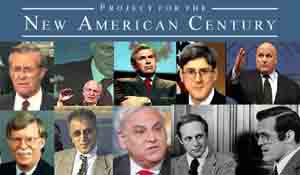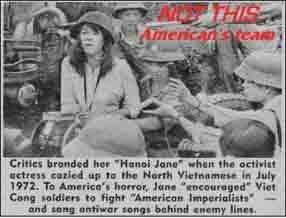How can we recognise the push for international laws in our neighborhoods?


 #1 way: Boring planning meetings where hardly anyone knows what's going on (besides the planners). These are the visionings that Rebuild America under international Local Agenda 21 Plans. The first clue that our local law is under assault is that all these new regulations are always suggested by an unelected, non-governmental or "citizen" ADVISORY COUNCIL. The picture below represents the small meetings where reinventing government is taking place across the country.
#1 way: Boring planning meetings where hardly anyone knows what's going on (besides the planners). These are the visionings that Rebuild America under international Local Agenda 21 Plans. The first clue that our local law is under assault is that all these new regulations are always suggested by an unelected, non-governmental or "citizen" ADVISORY COUNCIL. The picture below represents the small meetings where reinventing government is taking place across the country. 

 Look for signs of recent REBUILDING or RENOVATIONS of existing land management plans promoting sustainable development of renewable energy AND Asset Based Community Development of ALL human capital resources. Municipalities across the country have adopted International Building and Abatement Codes, and all the new regulations and permit processes all originated with the international ideology of sustainable development. CITY TAKES OVER APARTMENT BUILDING AFTER OWNER REFUSES TO MAKE REPAIRS.
Look for signs of recent REBUILDING or RENOVATIONS of existing land management plans promoting sustainable development of renewable energy AND Asset Based Community Development of ALL human capital resources. Municipalities across the country have adopted International Building and Abatement Codes, and all the new regulations and permit processes all originated with the international ideology of sustainable development. CITY TAKES OVER APARTMENT BUILDING AFTER OWNER REFUSES TO MAKE REPAIRS.Everyone who's anyone is hip to the NEED for a stronger global humanitarian authority. Many media personalities with major access play a huge role in the UN plan for global communitarian government. Communitarian is humanitarian.



 Community Police (COPS) were created by the think tank behind the international Third Way.
Community Police (COPS) were created by the think tank behind the international Third Way. DWI arrests have skyrocketed across the country. We all know someone who's been arrested for driving under the influence. These arrests are for the potential for crime, NOT for an actual crime under U.S. Criminal Law that follows Constitutional Principles. DWI/DUI laws are based in the Communitarian principle that preventing citizens from harming the community (or themselves) is more valid than requiring that an actual crime (with a clear victim) be committed before allowing the police to detain a suspect. Protecting us from ourselves is communitarian "thinking." (Rescuing Iraq and Afghanistan from themselves is also communitarian thinking.) Legitimate U.S. laws (and declaration of wars) requires that actual damages be proven beyond a reasonable doubt. Communitarian law takes the reason out of resoning. Drunk drivers DO NOT commit actual crimes with actual victims. There are no specific damages in a DWI, the suspects are only proven to have committed the potential to commit a crime.
DWI arrests have skyrocketed across the country. We all know someone who's been arrested for driving under the influence. These arrests are for the potential for crime, NOT for an actual crime under U.S. Criminal Law that follows Constitutional Principles. DWI/DUI laws are based in the Communitarian principle that preventing citizens from harming the community (or themselves) is more valid than requiring that an actual crime (with a clear victim) be committed before allowing the police to detain a suspect. Protecting us from ourselves is communitarian "thinking." (Rescuing Iraq and Afghanistan from themselves is also communitarian thinking.) Legitimate U.S. laws (and declaration of wars) requires that actual damages be proven beyond a reasonable doubt. Communitarian law takes the reason out of resoning. Drunk drivers DO NOT commit actual crimes with actual victims. There are no specific damages in a DWI, the suspects are only proven to have committed the potential to commit a crime.  The lovely new Homeland Community Police also have Mental Health Officers. They perform "community interventions." These cops assist in many areas of the reinvented government, including drafting new laws, advising citizen councils to push for new communitarian laws, door to door data gathering, implementing GIS community mapping of assets, making sure the new laws are in the land management and Homeland Security Plans, and last but not least, enforcing all the new laws.
The lovely new Homeland Community Police also have Mental Health Officers. They perform "community interventions." These cops assist in many areas of the reinvented government, including drafting new laws, advising citizen councils to push for new communitarian laws, door to door data gathering, implementing GIS community mapping of assets, making sure the new laws are in the land management and Homeland Security Plans, and last but not least, enforcing all the new laws.
 Many more of our men go to jail every day for charges under Domestic Violence Acts that gave more rights to the victims than to the accused. Criminal justice professionals admit the laws haven't exactly protected women the way they were originally thought to, but that hasn't stopped cities from adopting all the programs associated with the DV law.
Many more of our men go to jail every day for charges under Domestic Violence Acts that gave more rights to the victims than to the accused. Criminal justice professionals admit the laws haven't exactly protected women the way they were originally thought to, but that hasn't stopped cities from adopting all the programs associated with the DV law.



Hollywood actors/holistic spokespersons share the same more moral, international vision of global peace and justice as the Nazis in the Hague.
 International-communitarian law is the direct opposite of U.S. law. The U.S. was founded on the understanding that authority of law was best left in the hands of the individuals who make up the body of the authentic state.
International-communitarian law is the direct opposite of U.S. law. The U.S. was founded on the understanding that authority of law was best left in the hands of the individuals who make up the body of the authentic state.

 Americans engaged in the current war-anti-war "street debates" are playing out their designated, predetermined role in the synthesis agenda. Useful idiots and civil unrest instigated by trained change agents is inherent to creating the vision promised by the Hegelian-Marxist theory of "constant conflict and forced evolution." Queen Beatrix's court will be happy to mediate between the American Far Left and the American Far Right, and why shouldn't they? The International Court guides the evolving earth people to moral justice with a "balance."
Americans engaged in the current war-anti-war "street debates" are playing out their designated, predetermined role in the synthesis agenda. Useful idiots and civil unrest instigated by trained change agents is inherent to creating the vision promised by the Hegelian-Marxist theory of "constant conflict and forced evolution." Queen Beatrix's court will be happy to mediate between the American Far Left and the American Far Right, and why shouldn't they? The International Court guides the evolving earth people to moral justice with a "balance."
 LINKS to UN Agencies.
LINKS to UN Agencies.
NARC
U.S.-U.N. Association.
Community Councils.
Social Justice.
World Political Forum Members List
Webster University Seminar and book launch: The Hague Legal Capital of the World The Hague, 28 February 2005.
Environmental Law.
Global Campaign for Peace Education April 2005 pdf file, from the Hague Appeal for Peace. This program suggests teaching American childen to "think" as global citizens as early as age four. Are Angelina and Madonna wanna-bes to be the role models?
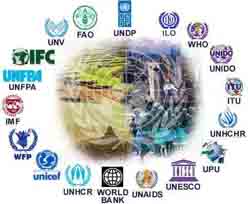
[ BACK TO TOP ]
copyright © 2001-2004, Niki Raapana and Nordica Friedrich (The Anti-Communitarian League)
 http://nord.twu.net/acl/intlcourt.html
http://nord.twu.net/acl/intlcourt.html
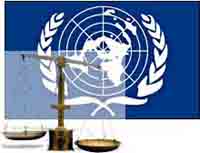


 Ark of Hope will be in the Netherlands, June 18, 2005: "The National Committee for International Cooperation and Sustainable Development in the Netherlands, along with KIT is hosting the Ark of Hope. The Ark will travel throughout the Netherlands introducing people to the Earth Charter, and inviting citizens and students to add their hopes for the future to the Temenos Books held within the Ark."
Ark of Hope will be in the Netherlands, June 18, 2005: "The National Committee for International Cooperation and Sustainable Development in the Netherlands, along with KIT is hosting the Ark of Hope. The Ark will travel throughout the Netherlands introducing people to the Earth Charter, and inviting citizens and students to add their hopes for the future to the Temenos Books held within the Ark."

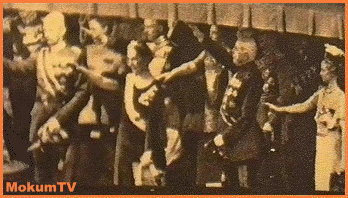 (ALL HEIL QUEEN BEATRIX!)
(ALL HEIL QUEEN BEATRIX!)














 The theory of utopian communism always included a world government ruled by more evolved world citizen councils.
The theory of utopian communism always included a world government ruled by more evolved world citizen councils. 




 Solomons Temple.com By Jerry Goldin. Our state constitutions are not based in Jewish mysticism, Talmudic Law, or Marxist collectivism. We don't know if they're based in freemasonry. We do know they're all designed to protect individuals and their property from government agents. The international definition of "human rights" is a Freemason term that incorporates the Marxist collectivist ideal of redistribution of private property. Individual liberty and justice for all US state citizens protects our self-determination and our natural, God-given inalienable rights to life, liberty, and the pursuit of happiness. International "human rights" assumes state control of all the land in the world, and over all the people in the world. The new laws direct our actions in ways that will keep us "safe." Our old laws kept us free. Should international law ultimately prevail in this final Hegelian conflict of ideals, Americans will lose their property and the right to control their own destinies. Interview with the Vamp by Bina Shah, May 24, 2005
Solomons Temple.com By Jerry Goldin. Our state constitutions are not based in Jewish mysticism, Talmudic Law, or Marxist collectivism. We don't know if they're based in freemasonry. We do know they're all designed to protect individuals and their property from government agents. The international definition of "human rights" is a Freemason term that incorporates the Marxist collectivist ideal of redistribution of private property. Individual liberty and justice for all US state citizens protects our self-determination and our natural, God-given inalienable rights to life, liberty, and the pursuit of happiness. International "human rights" assumes state control of all the land in the world, and over all the people in the world. The new laws direct our actions in ways that will keep us "safe." Our old laws kept us free. Should international law ultimately prevail in this final Hegelian conflict of ideals, Americans will lose their property and the right to control their own destinies. Interview with the Vamp by Bina Shah, May 24, 2005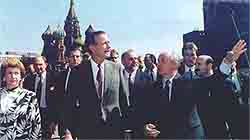
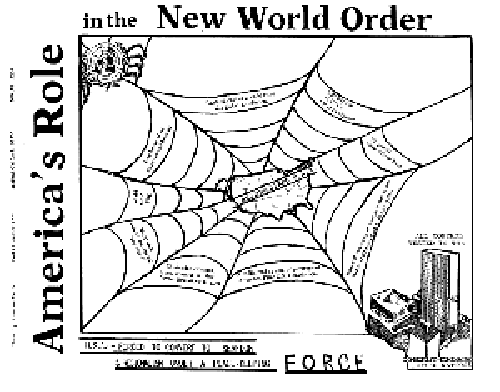
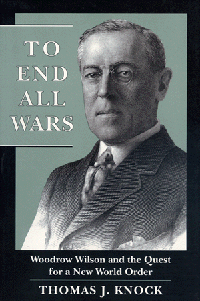
 The founders of the first international "people's tribunal" were British Fabian Socialists. Global law and the global court are very, very real .. and very easily verified. (UNEP GEO-3 is a good place to begin.) We're often asked by our American friends, "Okay, so who's behind the plan, the Illuminati?" Our answer to that is the top is murky, and there is no concrete evidence linking only one person (or family) to the top of the new World Empire. It's an old plan, we know that for sure, but whether the Illuminati started it or the Bilderbergs now control it doesn't really matter to us anymore. What matters to us most is the LAW itself, who wrote it, who endorses it, how it is worded, and where it is being enforced, in the United States. Our primary focus remains on how international law is changing the U.S. political economy. Communitarian laws (such as the ICC) balance national laws that interfere with global redevelopment agendas. This can define everything from building pipelines in the Middle East to protecting American land from Americans.
The founders of the first international "people's tribunal" were British Fabian Socialists. Global law and the global court are very, very real .. and very easily verified. (UNEP GEO-3 is a good place to begin.) We're often asked by our American friends, "Okay, so who's behind the plan, the Illuminati?" Our answer to that is the top is murky, and there is no concrete evidence linking only one person (or family) to the top of the new World Empire. It's an old plan, we know that for sure, but whether the Illuminati started it or the Bilderbergs now control it doesn't really matter to us anymore. What matters to us most is the LAW itself, who wrote it, who endorses it, how it is worded, and where it is being enforced, in the United States. Our primary focus remains on how international law is changing the U.S. political economy. Communitarian laws (such as the ICC) balance national laws that interfere with global redevelopment agendas. This can define everything from building pipelines in the Middle East to protecting American land from Americans.



![[ Death ]](http://nord.twu.net/acl/images/nytetzioniempire.jpg) People really hate to admit this, but the U.S. Bill of Rights is a barrier to enforcing international laws against American citizens. The key to recognizing international law in the U.S. is that it balances our individual liberty against the vague, global collective, or the "common good." On the global scale, the ICJ prosecutes national leaders for war crimes and mediates disputes in relations between nations (and many on the American left want to see the Bush cabal tried before the ICJ for Crimes Against Humanity). The "problem" with this court (according to the "experts") is it has no enforcement arm to ensure its decisions are upheld.
People really hate to admit this, but the U.S. Bill of Rights is a barrier to enforcing international laws against American citizens. The key to recognizing international law in the U.S. is that it balances our individual liberty against the vague, global collective, or the "common good." On the global scale, the ICJ prosecutes national leaders for war crimes and mediates disputes in relations between nations (and many on the American left want to see the Bush cabal tried before the ICJ for Crimes Against Humanity). The "problem" with this court (according to the "experts") is it has no enforcement arm to ensure its decisions are upheld.  Deconstructing the "Human Rights" Ideology by
Peter Myers B. A. Hons B. Sc., 21 Blair St., Watson ACT 2602 Australia. Ph -61-2-62475187. Date 17 Nov. 95.; Update 15 Dec 95.
Deconstructing the "Human Rights" Ideology by
Peter Myers B. A. Hons B. Sc., 21 Blair St., Watson ACT 2602 Australia. Ph -61-2-62475187. Date 17 Nov. 95.; Update 15 Dec 95.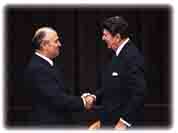
 The US adopted Local Agenda 21 inititatives way before 1993, and the Association of US Mayors endorsed the Earth Charter in 2000. In the decade since the Earth Summit at Rio, thousands of plans with similar revisions of municipal laws have passed across America. We have many new government intrusion policies that were introduced in everything from neighborhood and habitat plans to smoking bans and noise revsisions.
The US adopted Local Agenda 21 inititatives way before 1993, and the Association of US Mayors endorsed the Earth Charter in 2000. In the decade since the Earth Summit at Rio, thousands of plans with similar revisions of municipal laws have passed across America. We have many new government intrusion policies that were introduced in everything from neighborhood and habitat plans to smoking bans and noise revsisions. 

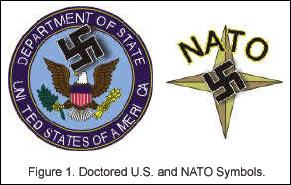

 The Peace Movement has openly pleaded with the international court to intervene in the U.S. and assist with a "regime change." Many countries want the U.N. to take over policing Iraq, and England itself wants to try Prime Minister Blair in the International Court for going along with Bush. What a precedent that would set! Former Watergate reporter Bob Woodward has written a book blaming Bush for the whole fiasco, and Bush is a perfect candidate for the first international criminal trial of an American President. As more and more groups turn to the International Court for redress of greivances, we are led deeper and deeper into the communitarian synthesis.
The Peace Movement has openly pleaded with the international court to intervene in the U.S. and assist with a "regime change." Many countries want the U.N. to take over policing Iraq, and England itself wants to try Prime Minister Blair in the International Court for going along with Bush. What a precedent that would set! Former Watergate reporter Bob Woodward has written a book blaming Bush for the whole fiasco, and Bush is a perfect candidate for the first international criminal trial of an American President. As more and more groups turn to the International Court for redress of greivances, we are led deeper and deeper into the communitarian synthesis. 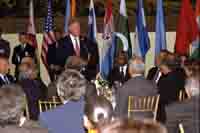


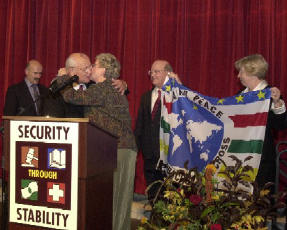

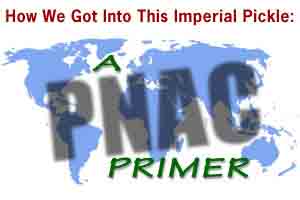 Here's a PDF file of the Draft Resolution for a new world justice system. It's being promoted by Americans in the Peace Movement (which includes Republicans, Democrats, Socialists, Communists, American Libertarians, the entire alternative left and right wing presses, thousands of freely elected politicians, political activist- movie stars, religious leaders and conventional churches, labour, Greens, feminists, New Agers, anarchists and eco-terrorists). The U.N is billed as the solution to world conflict, when in actuality it CREATED the conflicts.
Here's a PDF file of the Draft Resolution for a new world justice system. It's being promoted by Americans in the Peace Movement (which includes Republicans, Democrats, Socialists, Communists, American Libertarians, the entire alternative left and right wing presses, thousands of freely elected politicians, political activist- movie stars, religious leaders and conventional churches, labour, Greens, feminists, New Agers, anarchists and eco-terrorists). The U.N is billed as the solution to world conflict, when in actuality it CREATED the conflicts.
